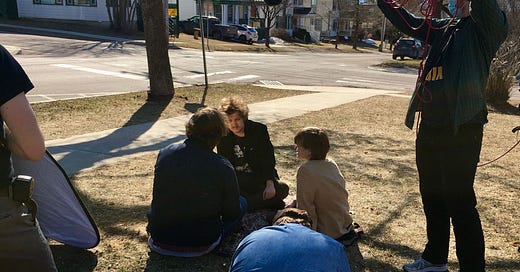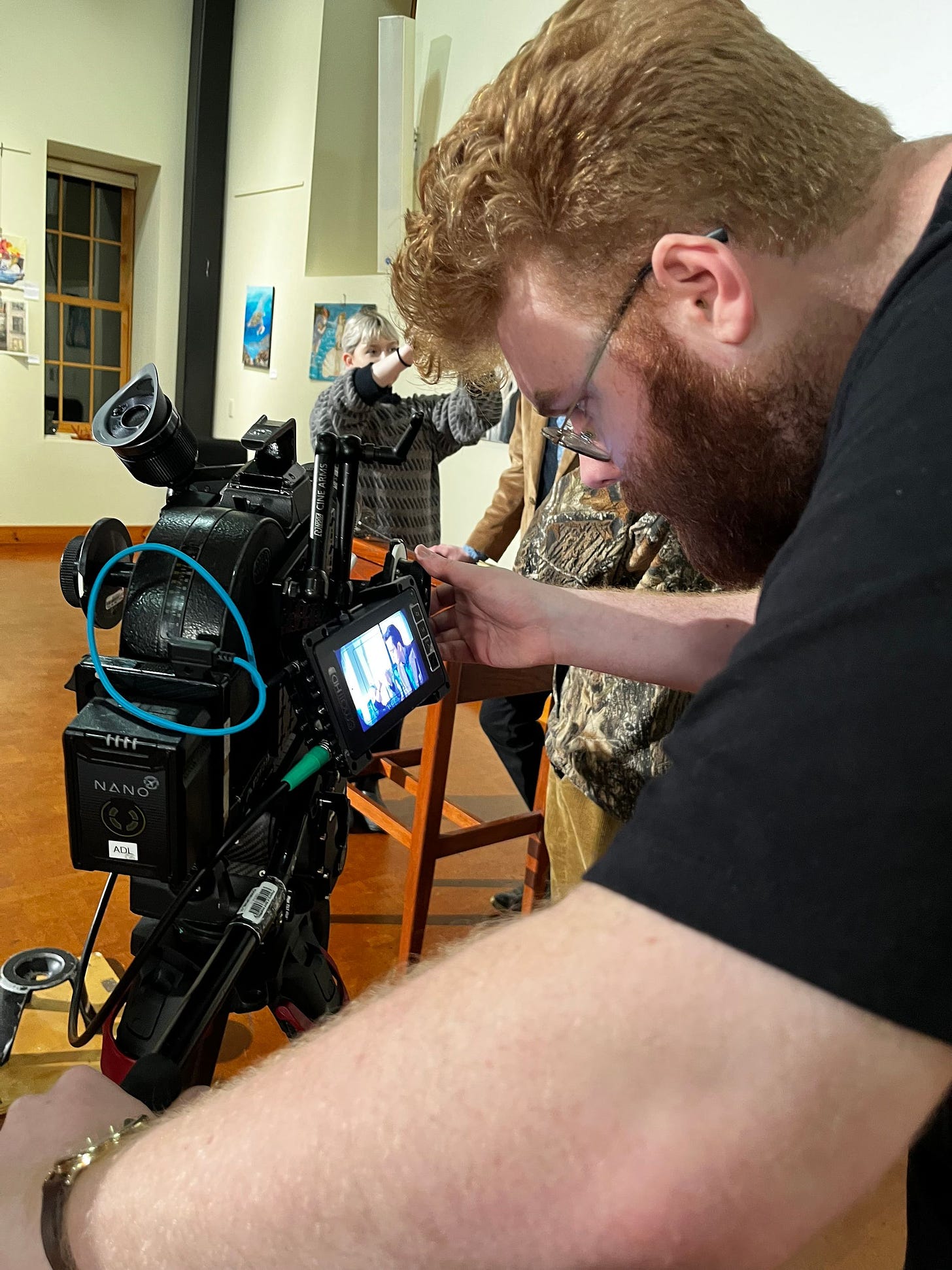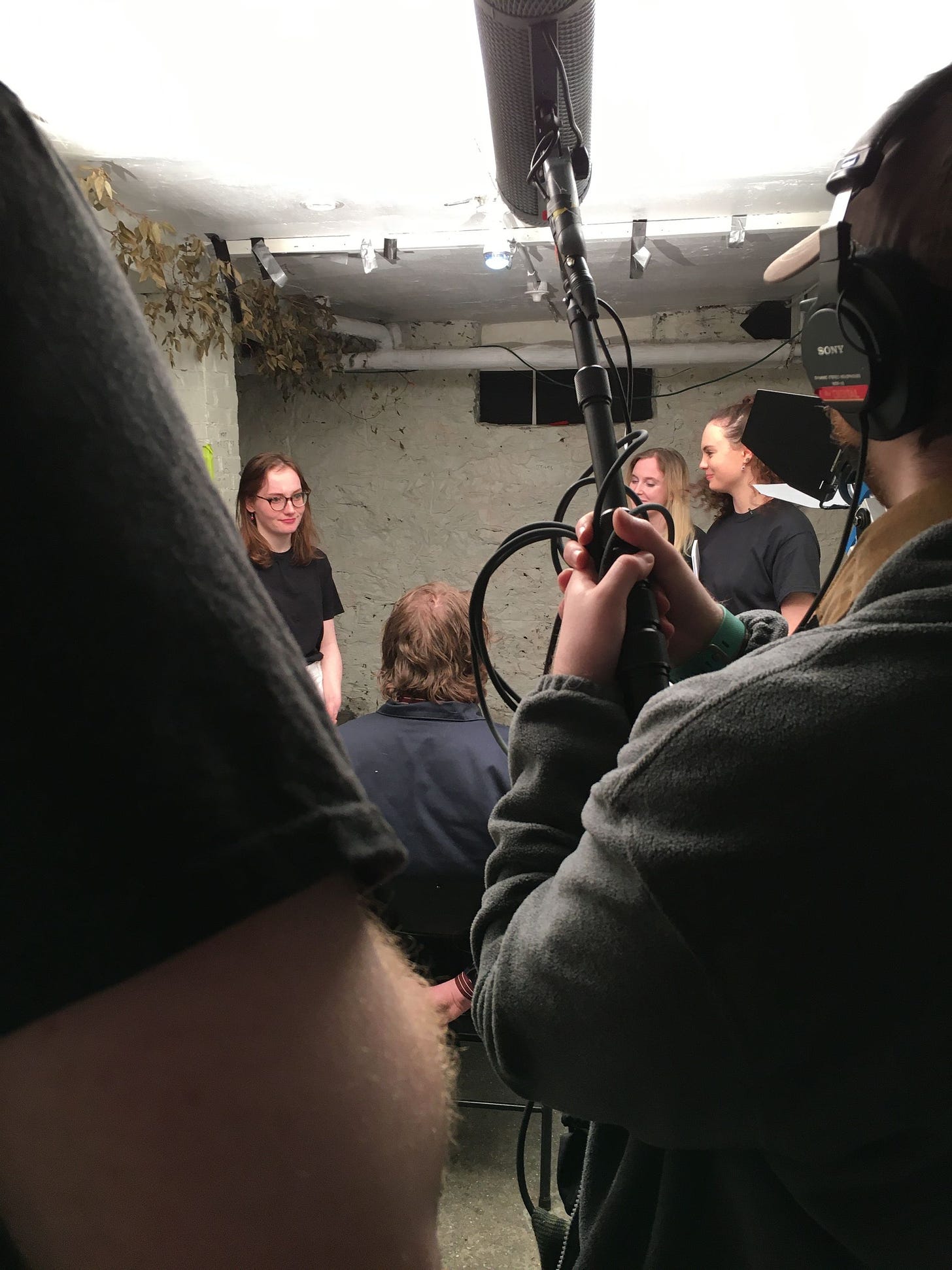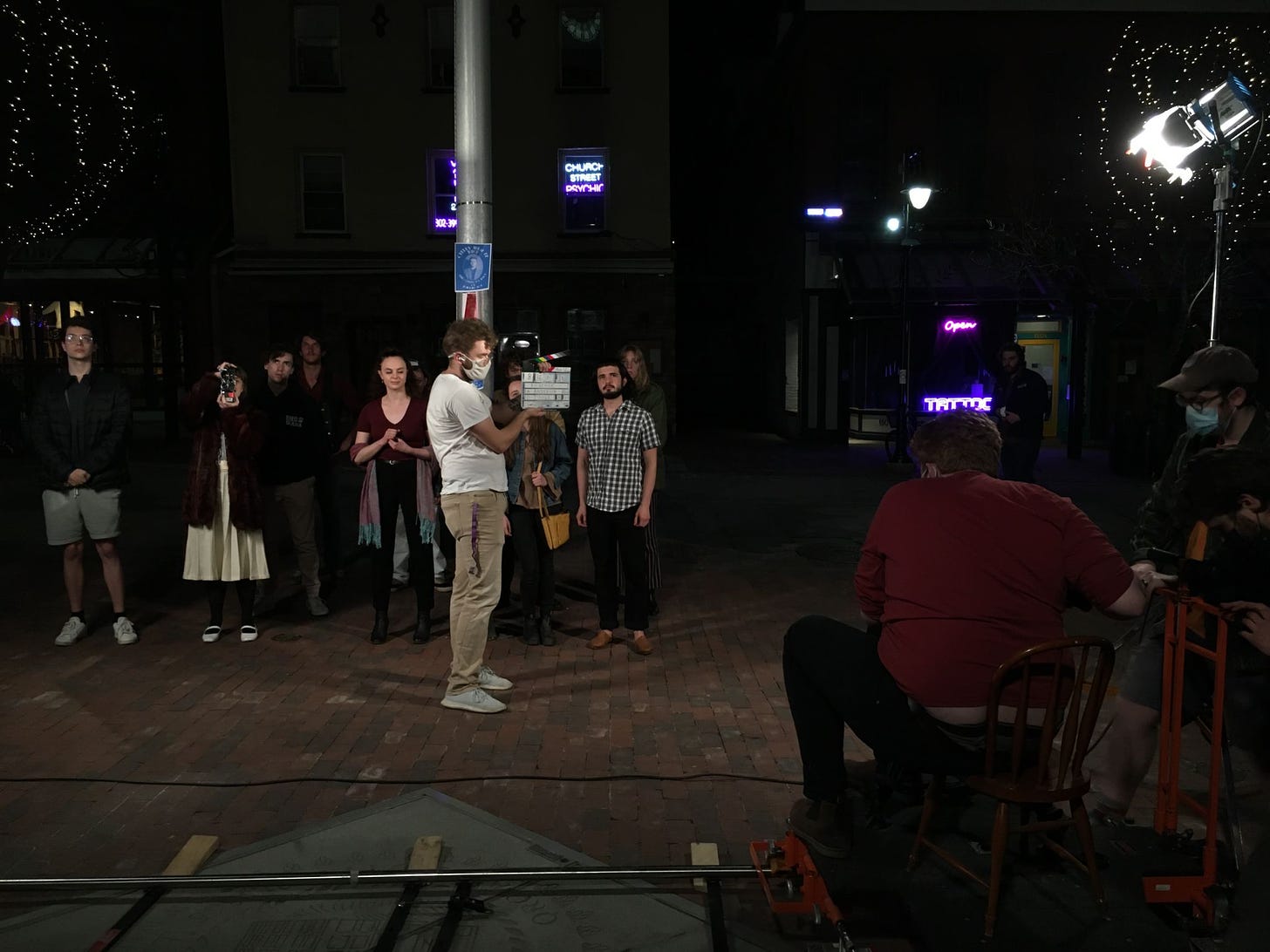"Conspiracy of Language": A Conversation with the Filmmakers of Pomp & Circumstance
Chatting with directors Adrian Anderson and Patrick Gray, as well as cinematographer Dillon Toole ahead of the film's screening in Toronto on August 16 at Market Video.
On August 16 at 8pm, Bleeding Edge will be screening Pomp & Circumstance, a funny, original New England college town farce that picks up where the counterculture comedies of the 1960s—in particular Brian De Palma’s Greetings and Hi, Mom!—left off. Co-director Adrian Anderson will be in attendance for the screening and local Twitter celebrity Will Sloan will be on hand to moderate a Q & A.
Filmed on 16mm in Burlington, Vermont (where co-director Adrian Anderson and cinematographer Dillon Toole attended college together) for a shoestring budget, Pomp parodies the insular mentality of college students in the post-Bernie Sanders era while one of their professors, James Cherry conducts an insurgent, polarizing campaign for the mayoralty (a position once held by Bernie himself).
Before our screening on Friday, we called up directors Adrian Anderson and Patrick Gray, as well as cinematographer Dillon Toole, to chat about the film and how it came together.
Bleeding Edge: How do you guys know each other? And how did this project get started?
Patrick Gray: Adrian and I transferred to Emerson College in Boston around the same time… We were about to graduate, I had a script written, and then we were talking, and it evolved.
Adrian Anderson: I went to two different colleges. I met Dillon at Champlain College in Burlington…
Dillon Toole: Adrian jumped ship. He left me behind.
AA: …and Dillon, you were one of maybe three people in the entire film production department that seemed interested in movies. So a mutual sort of blood leaching began. I had these resources, and I wanted to do something on 16mm. Patrick had this play he had written. We were both interested in that mélange of 60s new American cinema, and we were both very attracted to talky 90s cinema and thus this thing was born.
BE: It was definitely more in vogue, if you go back to the 1960s or 70s, to have characters throwing out references to French philosophers and intellectual concepts and the like. Were there any touchstone films from that period that you were intentionally trying to reference with the film?
PG: From that period? Definitely Brian De Palma’s Hi, Mom! and Greetings.
AA: Greetings, especially,
PG: A lot of stuff from the 90s, like Hal Hartley…
AA: Surviving Desire was a big one.
PG: Surviving Desire, Theory of Achievement, Ambition. And then Whit Stillman, I don't know, Masculin Féminin a little bit too.
AA: We talked about Ralph Bakshi’s Heavy Traffic and Fritz the Cat a lot, especially the first 30 minutes of Fritz.
DT: The early De Palma stuff, especially. We liked how it looked, Ektochrome adjacent, you know? Very candy colored, glossy. The simplicity of how that stuff was shot seemed like a natural choice.
BE: So you shot Pomp & Circumstance on 16mm, which is definitely not the easiest thing to do for a micro budget film, was there anything else that helped you figure out a visual style?
DT: Yeah, definitely. I mean, film can be duped pretty easily, digitally. But the thing about shooting on actual physical film, aside from that unique, baked-in aesthetic that we're trying to capture of the 60s and 70s, is that it also changes your workflow. It changes the way you direct, it changes the way you block, it changes the number of shots you can schedule for a day, how many takes you can do, what your ratio is, all that stuff. The three of us were very enthusiastic about doing that. Back in the 60s and 70s, the De Palma and all these guys were running around and shooting with equipment that they could bring on subways, so it was really important to keep our package, keep our camera setups, keep everything simple.
BE: As directors, Patrick and Adrian, what challenges were there to shooting on 16mm?
AA: It's funny, because you watch those early De Palma movies, and they’re almost like early mumblecore, even like Matt Farley-style of, “Hey, you're my friend! You can be in this!” And you can tell that by some of the performances. When you shoot on film, however, and you invite a friend and he doesn't learn his lines, or someone just screws up, you can mentally picture $200 being shoveled into the fire.
DT: I want to give a little credit to the star of the show in terms of consummate professionalism, Mike Slater, who plays our mysterious, central vocal figure. He was born to be shown on film. We never even had to do a second take with him. Everything was perfect. He nailed everything.
AA: God bless Mike Slater. He didn't seem to understand the logistics of a film shoot. So it's like I was booking him for two separate Elvis performances.
BE: I was going to ask about that. He’s a real Elvis impersonator?
DT: He is the Elvis impersonator.
AA: I talked to maybe five different Elvis impersonators in New England when looking for an actor and a lot of these guys are older. So one of them, in particular, would just start calling me and asking me questions about, you know, Elvis, but also about my day. And he would go on for 15 minutes. I loved it, but I felt bad because… I wasn't just humoring him, but I knew I wasn't going to go with this guy. At another point, I was concerned about getting myself in trouble with Elvis Presley Enterprises, right? They're a litigious bunch, so I went to the end credits of Bubba Ho-Tep, the great Elvis movie, and I was desperately reaching out to their Elvis consultant.
DT: I want to add also that the Elvis estate is allegedly very litigious, just to protect us.
AA: I mean, Mike plays an Elvis impersonator, but when you go to the credits, he's listed as Mike Slater. He plays himself. One other thing I would like to add about the influence of early De Palma is there is something aggressively modern about those films that still feel like that. Especially that opening of Hi, Mom!, which is parodying a famous tenants rights commercial from the 60s. You watch it, and it's almost like a Good Neighbor or Tim and Eric sketch the way it's just these quick shock jokes. It's such a perfect hook. I immediately started to see a dialog between those movies and the current moment. There was a lot of discussion between me and Patrick and me and Noah [Brockman], one of the actors, about this kind of weird, impotent, 2010s college life. And there were a lot of parallels we were seeing between the failures of the 60s and the post-Bernie Sanders Vermont era.
BE: Yeah, that makes sense. Did you guys know that The Holdovers was going to be coming out with a similar kind of setting? Did it steal your thunder at all?
AA: I wouldn't say so.
DT: No, I don't think we could have known honestly. When did we start production on this? Do you remember the dates?
AA: We were scouting in January and February of 2021. A lot of that was just going to places and begging them to be locations, Burlington is not a gigantic city by any means.
BE: Was there any other reason that you wanted to shoot in Burlington, specifically? I feel like now it's mostly known as Bernie Sanders’ hometown.
AA: I don't think there are a lot of great New England movies in general, controversially. And I don't think I've ever really seen a great Vermont movie. A lot of Indies shoot in Vermont, but the only real Vermont film I can think of that is really great is Adolfas Mekas' Hallelujah the Hills, which is a great Marx Brothers in the snowy woods riff. Burlington was not only ideal in terms of allowing shooting and the whole run and gun guerilla thing, but also it’s the perfect sort of, and I say this lovingly, echo chamber-y, small college town where you can really be in your own bubble. You can just go to the university and not interface with anyone else or anyone that actually lives in this place. And I think that speaks to the way the characters are processing things and interacting with the world. It doesn't really exist outside of them.
DT: Burlington is kind of like this death dream of the idealism of the early 70s. There were a few hippies in New York and California, and they were like, yeah, man, go to Burlington, Vermont. They're still kind of trying to hang on to that dream that has died, more or less. And that's what makes it kind of a unique place,
AA: A lot of patchouli, a lot of jam bands.
BE: This character of James Cherry, the college professor running for mayor, who seems to be some sort of commentary on populist politics of this current moment. Were there any specific inspirations for him? What was he supposed to represent in his intellectual, populist way?
PG: He is ultimately supposed to represent a similar thing to Noah's character, Thomas, and the Elvis character, but taken to a different kind of world where there's an intellectual community engaged in this conspiracy of language to make themselves like sound smart, to grant them the authority to be in this position, but it's all very thin, everything that he's saying. Nothing he's saying really makes too much sense. It kind of becomes paradoxical. So I guess what he's meant to represent is this kind of play acting taken to an intellectual extreme.
AA: He's definitely like a too-far-gone kind of character. I think at the end, all three characters realize that if they don't leave that bubble and don't remove their head from their ass, they can become James Cherry, who is just sort of this ouroboros of his own vanity.
PG: I know we talked about like, you know, the public intellectuals of the day. There's a little bit of Jordan Peterson in there, a little bit of Sam Harris.
DT: We had to tell Patrick [Malone, the actor who plays Cherry] to tone down the Canadian accent.
AA: Pat Malone and I used to play music together. We used to be involved in local punk bands and that sort of thing. There would always be like specific leaders in that community who would see themselves as these grand important figures. But whenever challenged, they would turn to arm shaking rage. This is his Sermon on the Mount, but ultimately, it's just nerd rage.
DT: There's a great scene in the film, when Izzy [Isabel Zaia, who plays Marie] is in Cherry's office. She's winding up the Bolex camera and it's really loud, and Cherry is just talking, and he has this look on his face of repressed rage. We let a six-year-old roll on that take. Do you remember that?
AA: We were shooting at Burlington Arts, which is an art gallery, and the main curator's child was there, and we were like, “Hey, do you want to roll on our film?” It was a non-union job.
DT: One of the only times the camera didn't jam is when that kid rolled. We should have kept him long-term.
BE: Can you tell me a bit about the actor Pat McGrath, who plays the leader of a left-wing terrorist group? He seemed a little bit out of the age range of the other actors so I'm curious if there's a story there.
AA: Pat McGrath owns a record store in Boston called Looney Tunes, which is a dark, damp vinyl basement where you can't really put a foot down anywhere. I would go down there and play 80s versions of Trivial Pursuit with him, and he would pull up different Rock and Roll Hall of Fame speeches to watch on his iPad. I found myself briefly working for him when I was in college. He is such a character that I asked him to do it. And Dillon, I'm sure you remember, we had to make sort of these Brando-esque cards for him.
DT: Yeah, we had the big cue cards going behind the camera,
AA: We gave him a script and he says all this kind of, you know, theory, gobbledygook speech, and the cards proved necessary.
BE: Yeah, I can imagine, Can you tell me how you’ve released this film? Where has it played and how have you gotten it out into the world?
AA: We shot in 2021 we had this cut, and it was not the longest script. I guess me and Patrick are thinking a lot about these Hal Hartley TV movies that were all around 50 minutes or an hour, and we had this truncated version of it. Then we both moved to Los Angeles briefly. We thought that's where you make movies. Dillon, you were out there at the time too. Turns out, it's very difficult to make movies in Los Angeles, and I was working full time, and the film just kind of fell on the backburner. I decided I couldn't do that anymore, so I left Los Angeles and we did pickups in early 2023
DT: It was like late March, yeah.
AA: We had played its first festival up here at a Tallahassee Film Festival in June of that year. So it played festivals, but there were a lot of cities we didn't play. So we've been on a road show the last two months, and it'll extend on until October. I'm just happy people are seeing it. Really excited to bring it to Toronto.
BE: So the last question I have is, what's next for you guys?
DT: Adrian and I are talking about whatever the next one is. We're definitely thinking about that, looking to the future.
AA: Yeah, Dillon's going to shoot the next movie.
DT: We have some really, really cool ideas. I don't want to tease people too much. Gonna put some really cool stuff in there, and then I'm going to be directing a film. And in the fall, Patrick, what are you up to?
PG: I've just been writing, focusing on writing, less so film stuff, I guess.
AA: I just did camera tests yesterday for a potential stop-gap short, and working on a few music videos, a few shorts, and this eventual next feature. Also, I've been producing a good amount. Dillon's thing. Fingers crossed. Tucker Bennett's next feature. Don't know if I can count this, but the next Matt Farley movie, Evil Puddle, and Jordan Tetewsky and Josh Pikovsky's next movie. So it was a busy 2023 and it's been a busy 2024 and maybe it'll even be busy next year, too.







